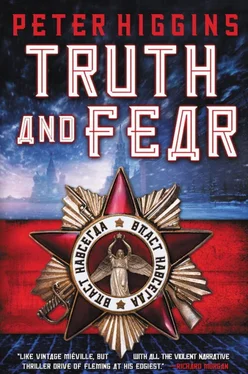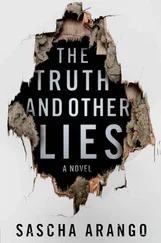The Archipelago covered the last twenty miles to the outer suburbs of Mirgorod so quickly that whole Vlast divisions were simply bypassed and cut off from retreat. Crouched in woodland scrub and shallow swampy depressions, they hid in desperate silence while the enemy marched past. More often than not, Archipelago skirmishers found them by the smell of uniforms stale with tobacco and sweat, the tang of disinfectant and the sickly sweetness of Sauermann’s Lice-Off.
When the Archipelago columns reached the Ouspensky Marshes on the eastern outskirts of Mirgorod they halted. They were within sight of the dull red hillock of the Ouspenskaya Torso, the remains of the first angel that fell dead from the sky: the place to which the Founder had travelled, four hundred years before, and where he had ordered the building of the city. The place where the Reasonable Empire had first become the Vlast. And, from her temporary headquarters in the Ouspensky Marshes, General Alyson Carnelian, Archipelago commander of the Mirgorod Front, sent a message into the city. It was an invitation to discuss surrender terms.
Against the advice of his officers, Rizhin didn’t send a representative but went to meet General Carnelian himself. The meeting was held in a single railway carriage that had been rolled out to the middle of the Bivorg viaduct and left there, suspended a hundred feet above the scrappy gardens and straggling suburban streets of Vonyetskovo Strel. It looked isolated. Marooned.
The carriage was a plush observation car appropriated from the Edelfeld-Sparre Line, thickly carpeted and furnished with red leather sofas, its vintage luxury somewhat faded by time. The walls were panelled in dark varnished wood, and the soft yellow light of electric chandeliers made the sky beyond the windows look wintry and bleak. Photographs on the walls showed sunlit southern landscapes: a slope of olive groves, a sun-bleached corniche above a strip of glittering sea. Places where Rizhin had never been. A small diesel generator was humming quietly somewhere.
General Carnelian was a tall heavyset woman of about fifty, uniformed in crisp olive green, greying blond hair cut short under a peaked red cap heavy with braid. Her face and hands were deeply tanned.
‘Some coffee?’ she said. ‘A cake perhaps?’ There was a plate of fancy patisseries. The kind you couldn’t get in Mirgorod, not any more.
‘No,’ said Rizhin. ‘Let’s get on with it. Say your piece.’
She fixed him with small hard green eyes. She is a soldier , thought Rizhin. Of course she is. The flannel with the coffee and the crude trick with the little sugar cakies is misdirection, only that.
‘We can take your city, General Rizhin,’ said Carnelian quietly. ‘Be in no doubt of that. Our bombers will flatten it. All of it. Every house and apartment, every school, every hospital, every bridge. I have six hundred Bison tanks. Each one weighs ninety tons. They will not bother to use the streets, they will drive straight through the buildings and grind the rubble to dust under the steel treads of their tracks. We will fill your rivers and canals and sewers with coal oil and ignite it. We will fill the cellars and underground shelters with heavy green gas that shreds the lungs of anyone who inhales it. Explosive gas. Once released, it lingers and drifts in ground-level clouds for days. Mirgorod will burn, and all the millions of people who live here will burn. All of you. There will be such death as you cannot possibly imagine.’
She paused to let Rizhin absorb the force of what she had said. The inevitable truth of it.
‘However,’ she continued, ‘I would prefer not to do this. I am a humane person, and I will avoid this cataclysm if I can. The city is already ours, in every sense that matters, but there is a choice, General Rizhin, and the choice is yours.’
Rizhin looked at her, smiling faintly, but said nothing.
‘Will you hear my terms?’ she said.
Rizhin sat back in his chair and gestured for her to carry on. ‘It would be interesting,’ he said.
‘If you capitulate,’ said Carnelian, ‘The city will be spared. It will not be destroyed. And I will go further. I am authorised to offer Mirgorod the status of an open city. Renounce all ties of allegiance to the Vlast and Mirgorod may establish its own civilian government and become a neutral bystander in the war. We offer diplomatic recognition of the city as an independent state. We offer advice and supply. We offer Mirgorod a seat in the Governing Parliament of Archipelagal States, with a status equal to any of the smaller Out Islands.’
‘And for me?’ said Rizhin. ‘What would there be for me? I mean me personally, of course.’
‘An honourable retirement, General. A small estate somewhere. Froualt, perhaps? And a reasonable pension. We might say two thousand roubles a year, something in that region. There would be limits on your future travel and communication, naturally, but for all practical purposes you would be free to live out a quiet and prosperous end to an illustrious career.’
‘These are reasonable terms,’ said Rizhin. ‘Very attractive.’
‘I expect you’ll want time to consider,’ she said. ‘You’ll need to discuss your answer with your colleagues, I understand that, and we would of course need to be assured that yours was a collective answer. A reliable agreement. But…’ She paused. ‘I would advise you against consulting with your masters who have fled. It’s easy to spend other people’s lives from a distance. I urge Mirgorod to make its own mind up. I can give you twenty-four hours. No more.’
‘There is no need for time,’ said Rizhin. ‘I speak for Mirgorod. That’s why I’m here.’
‘Good. Excellent. So, what do you say, General?’
‘I say you’re full of shit.’
‘I assure you—’ Carnelian began, but Rizhin held up his hand for silence.
‘You and I,’ he said, ‘what we’re fighting for here is a city. A capital city. If Mirgorod is not the capital of the Vlast it is nothing, it is meaningless, it no longer exists. You won’t burn it. What use to you is a million stinking corpses? What use to you is five hundred square miles of ash and rubble in a marsh on the edge of a northern ocean? This threat of burning is nothing. It’s shit. I could burn it myself, more easily than you could. Fuck, I would burn it myself, to stop you having it. But to destroy it is to lose it. You burn Mirgorod and you obliterate the idea of it, and it’s the idea of Mirgorod we’re fighting over here, not some piss and vinegar diplomatic compromise.’
Rizhin stood up to go.
‘So,’ he said. ‘You want my city, you come and get it. You fight for every inch, or you fuck off somewhere else and let the Archipelago find themselves a general who can.’
‘You can’t save the people of Mirgorod, General.’
‘You haven’t been listening,’ said Rizhin. ‘You should pay attention. I don’t want to save the people of Mirgorod, they are of no interest to me. What I want is a victory. And I’m going to have one. You’re going to give me one.’
For three hours out of Slensk, Lyuba Gretskaya followed the Northern Kholomora upstream, flying low through steady drizzle. The river slid beneath them, wide and slow and dark. Carpets of leafless birch and moss gave way to plains of tawny scrub grass and miles-long streaks of bare yellow earth. Twilight was thickening into night when the storm clouds rose from the north, clotting the horizon. Rags of wind buffeted the Kotik, sending it scrabbling and skittering across the surface of the air.
‘We’ll have to lie up overnight,’ said Gretskaya. ‘I’m going down while there’s still light to land by.’
Читать дальше


![Кэмерон Доки - Правда и ее последствия[Truth and Consequences]](/books/79610/kemeron-doki-pravda-i-ee-posledstviya-truth-and-con-thumb.webp)









